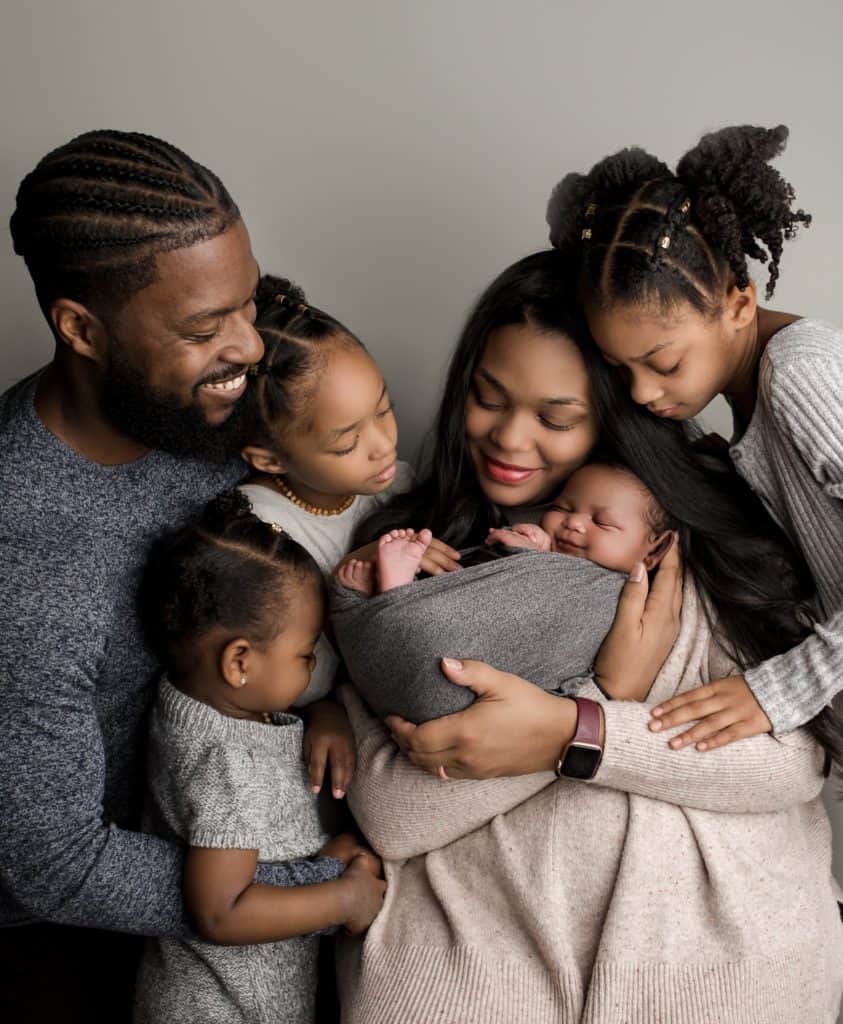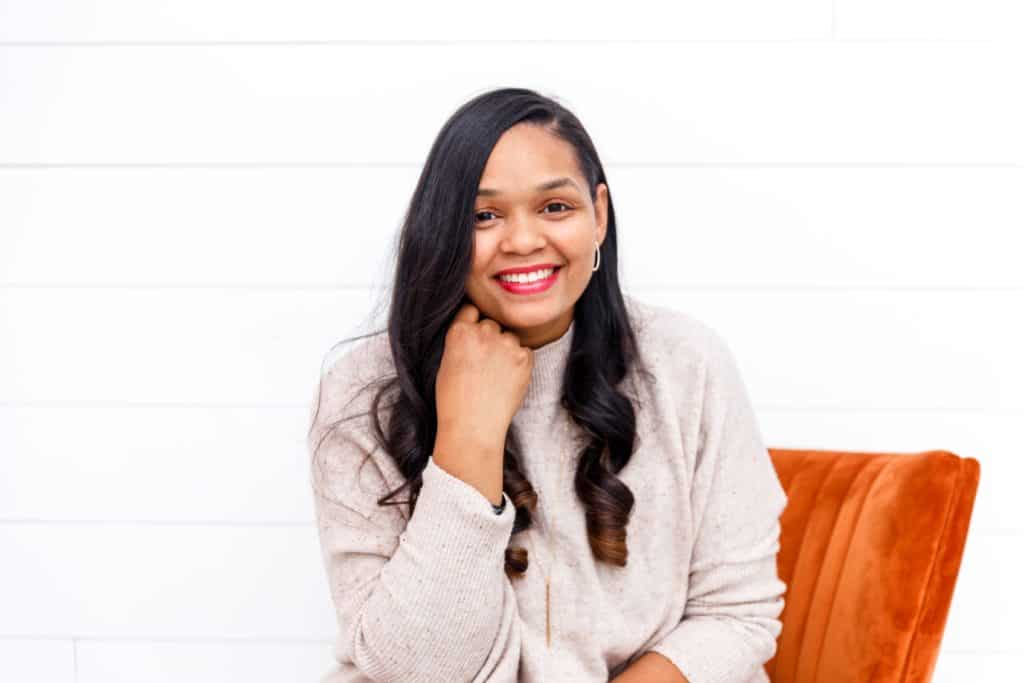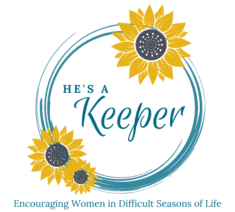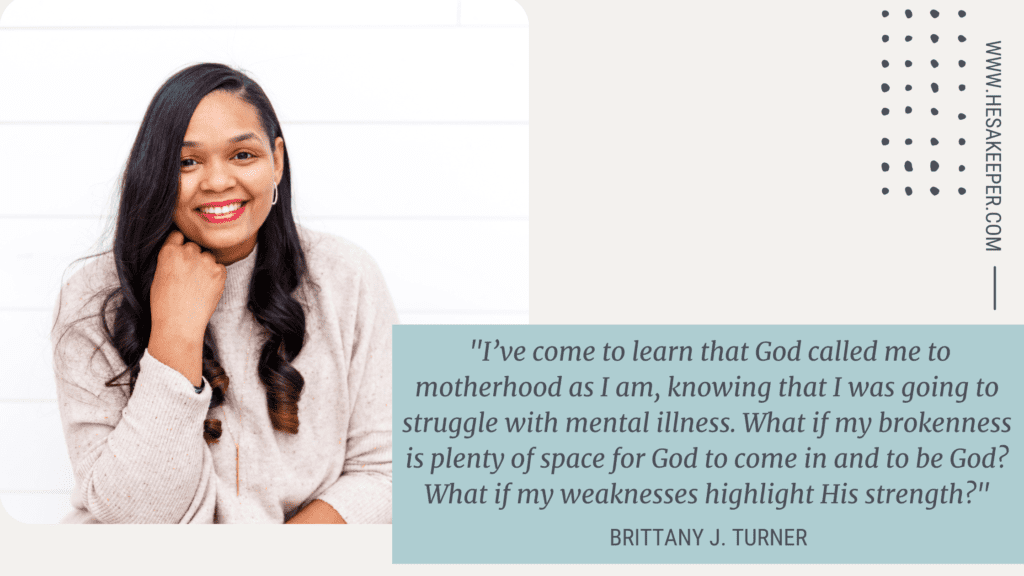As mothers, it is easy to shine a light on our areas of strength so that our children see the best parts of us. In our protective nature, we would much rather shield them from the broken realities of life than allow them to see the beauty of imperfection in the hands of a perfect God. But when we allow them to see the flawed parts of us, we have an opportunity to introduce them to their Savior – Jesus – the One who came full of grace and truth, lived a perfect life, and died a substitutionary death, making our brokenness of anthem of His grace and love.
I am honored to introduce you to Brittany Turner, who is using her battle with depression and anxiety as an opportunity to teach her four beautiful children about the brokenness of humanity and our need for Jesus. We share a very raw and honest conversation that will encourage your heart and point you to the One who knows you fully and accepts you as you are. My interview questions are shown in bold, and Brittany’s responses are shown in italics. You can read more about Brittany and find ways to connect in her bio at the end of this interview.
BRITTANY’S BATTLE WITH DEPRESSION & ANXIETY
Briefly describe how depression developed in your life.
I have battled with depression since my teenage years. I think it built up on the backs of a tumultuous childhood. My parents had a ton of issues they were working through, and as the oldest, I felt as if I had to troubleshoot their problems. I was also like the second parent in the house as I was the buffer to my younger siblings.
I also struggled to fit in at school because I was very different. I was bullied all through middle school, and the bully rode my bus. So I was bullied all the way to school, all the way from school, and during school. But the first time I experienced depression was in high school. 9th grade was varying levels of difficult, on top of what I experienced at home and during middle school. But 10th grade was probably the first time it hit me so hard, that through a series of other events, I attempted to take my life, and I ended up in an inpatient psychiatric ward. By the end of high school, I had been raped and my parents had chosen not to believe me. So, I think I just felt very alone.
After attempting to take your life, how did you cope and get through the remainder of high school?
I first got medicine for depression when I was admitted to the inpatient psychiatric ward in 10th grade, but none of the treatments helped. I felt happier on the medicine, but the particular medicine they put me on gave me a false hope. I just knew it wasn’t getting to the root of my depression; it was just taking the edge off so I could keep going in the moment. I knew this was not working for me. I knew it wasn’t going to fix the deep sense of sadness that was settled in my soul. I didn’t start feeling better until I started seeing a counselor at my school. Talking to her felt better than just taking the medication. I knew it was something I needed to keep doing.
High school sucked, and I say that from an overarching perspective. It was more bad than good. I can still look back at high school and say that there were some shining moments, some things that I enjoyed. And I think that’s key when you struggle with a mental illness, that you don’t blanket your whole life with the prevailing emotion.
What was your journey like after high school, and how have depression and anxiety played out in your adult years?
In college, I met my husband, and I re-met Jesus – like the real Jesus. I developed a relationship with Him. My husband and I didn’t date at first. He was my friend and helped me get to know Jesus. That was probably the biggest help I had because it was the first time I knew that I was valued and that I mattered not for what I achieved or contributed. He actually encouraged me to do less. That was probably the first time I felt like I could breathe from under the pressure of it all, truth be told.
So I met depression in 10th grade, carried it through high school, and started to get rid of it in college (freshman into sophomore year). After that, I dealt with the seasonal stuff of feeling a little down from it being gray outside all the time where I lived (Washington D.C. and New York for a while).
It probably didn’t come back and hit me in adult life until my second daughter was born. I saw it coming. I could feel this sense of dread. It was rooted in the fact that I didn’t feel like a great mom at first. It was a struggle for me starting motherhood, so adding another child felt like an impossibility. When I came to the other side of it, depression smacked me in the face, and it hit so hard – harder than my teenage years because I had responsibilities now – a husband, two children, and responsibilities as a teacher. I was supposed to go back to work, but I just couldn’t. As a teacher, I felt that I couldn’t add any other kids into the equation, but I knew I was the main provider at the time (my husband worked part-time). That was when I was like, “Okay, I’ve got to get up and go back to work. I don’t know how to get up, but I know that I cannot stay here as long as I might want to stay here.”
With my most recent pregnancy came anxiety. Depression is described as feeling very, very low, but anxiety feels like you’re hyped up all the time. It’s like an electric buzz – that feeling of “I have to do; I can’t sit still.” Sometimes I have racing thoughts. They jump so fast I cannot catch them. In this season, my anxiety has shown up a lot as rage. I just have a very short temper sometimes. Something will happen that breaks my heart when it should not be that heartbreaking. Like recently, I found myself crying because my kids broke a mug that was semi-special. I think about the fact that they broke the mug, but I haven’t gone looking for it since. Moments like that are what it looks like this time around. Constantly triggered while learning to cope and manage.

HOW MENTAL ILLNESS HAS AFFECTED MOTHERHOOD
You talked about how depression hit harder once your second daughter was born. I imagine it is very difficult and challenging, but will you talk a little more about how having a mental illness has impacted your mothering and your relationship with your children?
It has affected my relationship with them enormously, especially related to how I’ve stored memories, definitely with my second daughter. It was six months into her life when I started to get better and find my way out. My husband did an excellent job of capturing memories during that time. It took a lot of intentionality looking at pictures and videos to rebuild that memory and connection with her. I am much closer to her now, but it took focus and effort.
It affects their systems and routines all the time because it decreases my capacity. When my husband was home with them, he had them on great nap schedules. Me, I’m naturally a much more go-with-the-flow parent, so trying to create schedules against my nature and fight a mental battle is hard.
I feel like my anxiety and my fear have rubbed off on my oldest daughter. She’s the caretaker and wants to be there. She tries to buffer my reactions. It has taken a lot of intentionality the past two years of me telling her to “put her mask on first,” to take care of herself first. I have to remind her that she is not who God wants to mother these children. God called me, and although it is hard, God has given me the grace to do it. I have to be intentional about boundaries with my little helpers.
It takes a big toll on my mothering, but it has affected how I give myself grace as a mom. Where I am now, I’m not slow to anger, but I’m quick to apologize. To the best of my ability, I try to be reflective of what led me there and deal with that so I can make amends. It takes intentionality in apologizing, but it has become a total God-thing that I model for them what it looks like to make a mistake and to correct it, to make amends. It’s taught me how to own what’s mine. As I grow, I can slow the angry moments too, but that takes time to develop. For now, I give myself grace and space to grow.
How do you practically care for your children on really hard days when you are physically, mentally, and emotionally drained? What keeps you going when you feel at your worst?
The first thing, when I’m at my absolute worst, is that I have to stop doing. I am not saying this from the standpoint of someone who does not have a full schedule. I am a mom with a child who is in an extreme sport. She does cheerleading two times a week. I have another daughter who has cheerleading one time a week, and sometimes they have classes. I’m a homeschool mom, so I am responsible for their education. If I do not teach, they do not get taught. So I am not saying this from the standpoint of someone who does not already have a full schedule. But when I wake up and I am already overwhelmed, I don’t need to press myself to do “all the things” because then everything becomes a trigger. What my body is telling me at that moment is that something needs attention, and what needs the attention is probably me.
What I’ve learned is that with depression you need to do the basic things, like get up, take a shower, change scenery, get someone else around you (phone or in-person), eat. Do those things and that’s enough for the day if that’s all you can do. With anxiety, you need to stop the doing. If my kid was sick and had the flu and could not go to practice, what would I tell the coach? “She’s sick. She can’t go to practice today.” Or, if my car broke down and we couldn’t get there, what would I tell the coach? “The car broke down. She can’t get there.” My mental health is just as important as either of those two things. Mommy is going to break down if I take her to practice today. I don’t like to punish her because I suffer, so that may mean I ask my husband or other people that I trust to take her. But on days when it’s really, really bad and I can’t find someone else to take her, then what I do is stop doing. I choose to be there and be her mother more than something on the schedule.
If I can’t stop doing something, then I take everything else off my schedule. Not everything HAS to be done. It’s hard for me to do that for myself because we are people who feel like things have to be done. We can’t just stop living for our mental illness, but our mental illnesses are responding to deep-seated triggers. Our hormones are signals that something in the body is wrong. It’s not just an imbalance for me, my values need healing too. If I don’t address it now, rage will come up and scream like a toddler until I do. So on those days, I find the best thing to do is to create extra space. I have a limited capacity, so it’s best that I take something off my plate than try to force-feed myself everything. It’s just like if you go to a buffet. If you keep eating when you already don’t feel well, you’re not going to feel better. You’ve got to take something off your plate.
What do you hope your children learn from your battle with depression and anxiety?
The Bible tells us in Corinthians that our body is wasting away, but our inner man is being renewed day after day. And so it’s in that day-after-day walking that He is refining and sanctifying and making me more into His image. And it will be a daily walk for my kids. So the sooner they can understand that their imperfections, their mistakes, and their shortcomings are things for them to learn from and own so they can grow, not things for them to be embarrassed about or hide from, the better off they are. So my weakness on display is kind of like what Paul said, “I boast all the more gladly in my weaknesses that Christ’s glory may be displayed.”
I want them to know that mommy is far from perfect, and not infinitely strong. But, I do know someone who is. I want them to know that my weaknesses have built a well-worn path to His feet, one that I’ll use to teach them how to find their Savior. And one that I hope encourages them and provides the framework for boldness as they carve out their own.

THE IMPACT OF CHRIST’S POWER
As a Christian woman, how do you process your struggles with mental illness and find encouragement to keep going as a mom?
I think we take Christianity and we either want to make it so that it erases every struggle, or we amplify our struggles in the name of Christ (i.e., This is where we’ve got to sit). I think the beauty of being in Christ is that He is walking with us through the peaks and the valleys of the brokenness of this world hand-in-hand. He is not rescuing us out of it, but instead, He’s activating us in it, almost like a magnet. So as I’m walking through my joys, my sorrows, my greatest adventures and peaks, and the lowest of lows, He is holding my hand. And as I open my other hand, I can draw people to Him and link them to the same connection that I have with Him. It’s that magnetic effect.
We think we have to get to adulthood to attain perfection, but in actuality, that’s not what we need. What we need is to get to Jesus because the goal is not perfection. He lived perfect because He knew it was an impossible task for us. Yet, we keep trying to hold ourselves and our kids to that same impossible standard. He had to DIE to give that to us because we were never going to be able to get there on our own. I’ve come to learn that God called me to motherhood as I am, knowing that I was going to struggle with mental illness. What if my brokenness is plenty of space for God to come in and to be God? What if my weaknesses highlight His strength? I’ve got to be humble enough to get out of my own way and head to allow God to be God as I grow in Him.
How have you seen the Lord’s keeping power at work through your story?
He met me. He introduced me to who I really am, in all my brokenness and said that’s the one I want to keep. He’s not about improving us to love us better. He loves us as we are. Me at my absolute worst is who He loves. He has no desire to change me at my absolute core but just heal me from my brokenness. For me, Him being a Keeper is Him meeting me there, and there’s not a single time when I called and He didn’t answer. He’s faithful to meet us where we are and heal us from what hurts. That is the God I know.
ENCOURAGEMENT FOR OTHERS
What encouragement would you offer to women who are struggling with depression and/or anxiety?
Community is one of the things that has helped me the most. It is hard to build when you’re in the thick of it, so I would tell you to try to find one or maybe two good friends you can lean on just a little bit. Just having somebody to talk through things with you is a good thing. You need faith-filled believers to remind you of the truth. Be honest about what you need – meals, babysitters, self-care. Position yourself, although very uncomfortable and vulnerable, to be surrounded by people stronger than you.
They are able to encourage you, protect you, keep you from being taken by the enemy by reminding you of the word of God, pouring life back into you, reminding you that you are loved and that this season does not dictate who you are. This doesn’t mean you are the weakest, you look for people with deep roots in faith so they can help you stand in the rough seasons. Then do the same for them.
Our source is never people or things. They are resources that THE SOURCE gave us. Remember that you need Him; you’ve always needed Him.
Practice gratitude. I have a little book, and it’s called Little by Little. The book is really designed for you to be able to mark progress you’re making. But I’ve decided to just write down something every day that I want to remember. I look for the little things that God has given me every day. I start with one or two things; some days overflow. Dark seasons can feel so debilitating, but everything is not bad every day. On those dark days, that’s another tool I have.
Journaling, even if voice memos, is good. Don’t be afraid to talk to yourself. Self-awareness illuminated by the Holy Spirit (and therapy) has been a pathway to healing for me.
Is there anything else you want our readers to know?
Don’t be afraid of therapy. Don’t be unwilling to talk through the hard things to get to the root of what is unsettling you, there may be layers you need to work through. Don’t be afraid of doing the work in therapy. The more honest you are with your therapist, the more progress you will make. If you don’t feel like your therapist is working and hearing you, don’t be afraid to switch.
Understand your triggers. Try to do the work to find them. If you know that there’s a particular time in the day that triggers you, see if you can create a new routine around it, or see if you can outsource it. For me, bedtime is not a thing I can do. My husband knows he has to step in at bedtime; otherwise, I will lose it, mostly because my capacity is gone around 7:30 because of the way I serve my kids. So we built me in space and capacity there. Plan what you can, and lean into grace for the rest as you grow.
CLOSING COMMENTS
This concludes my interview with Brittany. It was a refreshing conversation on how owning our weaknesses can be a beautiful opportunity for our children to learn and experience the amazing grace of our great God and Father. I hope you are inspired to trust God with your brokenness and walk hand-in-hand with Him as you navigate life with depression and/or anxiety. He will sustain and keep you as you walk through this. I encourage you to connect with Brittany via any of the ways shown in her bio below. I believe that your life will be enriched by her love for Jesus and her ability to help you understand how to live out His truth on your journey.

About Brittany J. Turner
A wife and a mom to three gorgeous girls and one beautiful boy, Brittany is passionate about connecting her generation to the truth of scripture and the love of God; empowering them to live in the abundant life purchased by Christ at Calvary.
With a bachelor’s degree from Howard University and an MDiv from Regent University, Brittany uses her gifts to help God’s people bridge the gap between what they say they believe and how they can practically live an authentic and empowered Christian life. Teaching truth transparently is her trademark in hopes that her story can help others develop a deep and abiding faith as disciples at the feet of Jesus.
A DMV (D.C., Maryland, Virginia) native, she currently resides in Dallas, TX with her family.
You can connect with her in the following ways:
- Instagram: iambrittanyjturner
- Facebook: Brittany J. Turner: Bible Teaching Speaker & Writer
- Email: iambrittanyjturner@gmail.com
- Website: brittanyjturner.com
If this interview was helpful to you or you know someone who would benefit from reading it, feel free to share it. Also, leave a comment below or email me any thoughts or questions you have on this post. You can subscribe to my blog at the bottom of this page to receive notifications as other posts are published.



So encouraging to all Mommas. Thanks for sharing such a vulnerable topic
Thank you for reading, Carendylyn! I’m so glad you found it encouraging.